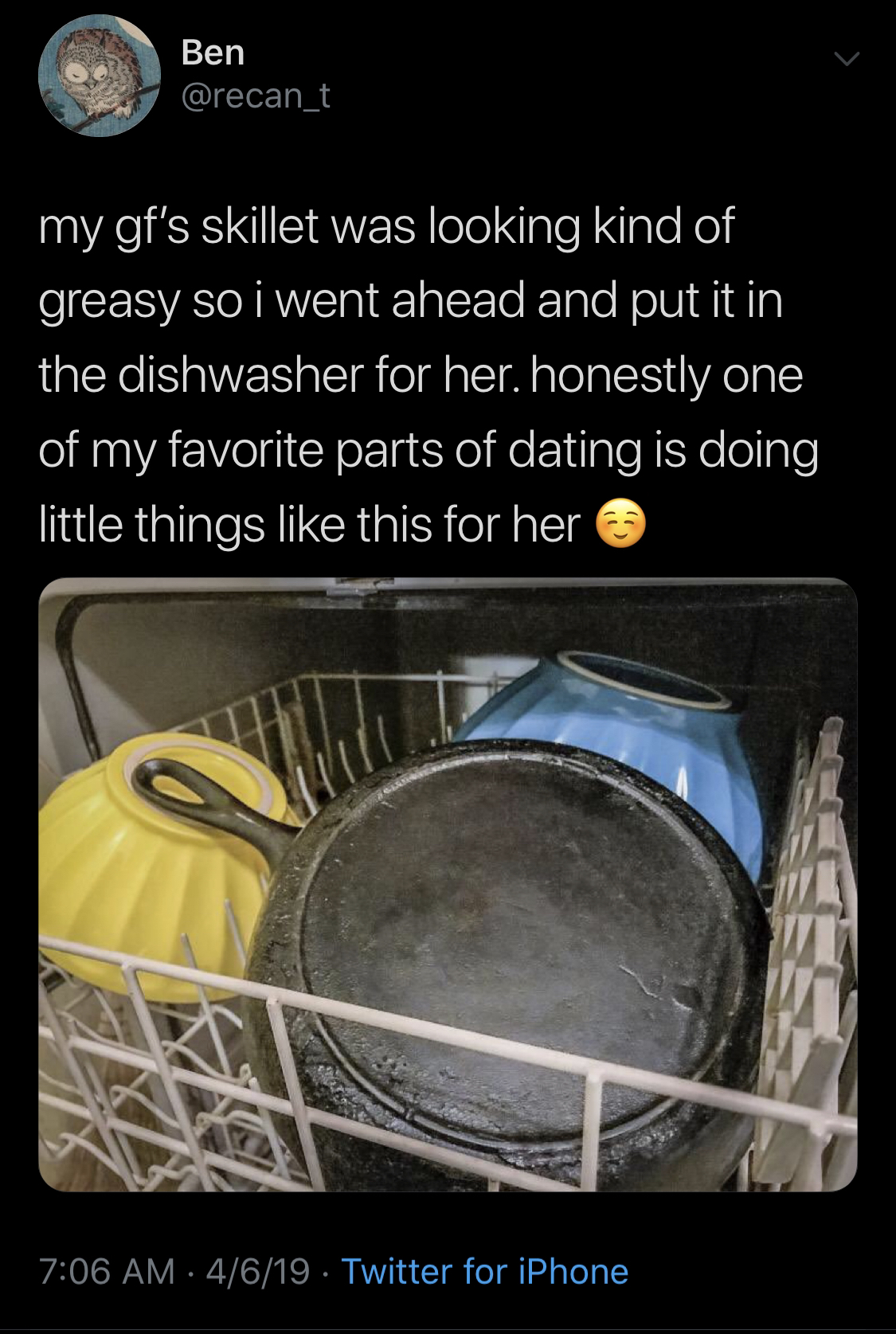Most of this is true, I’ve never used cast iron in my life
Some of this is cast iron, I’ve been true my whole life.
True is some of this, I’ve been cast iron my whole life.
True iron is some of this, I’ve been cast my whole life.
My whole life is cast iron. I’ve been true for some of this.
Cast iron life been true. I’ve my is of this for whole.
Bames Nond’s having a stronk, call a Bondulance.
That’s a skill issue. Get better.
make me
Cue montage of hard work being done over an energetic Kenny Loggins song
🍳🍳🍳🍳🍳
I’ll make you bb
I talked to your parents and they told me to tell you to get better.
*skillet issue
I bought a $20 cast iron pan at target, I season it like once a year. I just wash it and make sure to dry it, I’m sure this is against the rules. Seems to work fine for me though. I wouldn’t say it’s nonstick but it’s mostly fine.
A $20 Teflon pan would be flaking and unusable, so for $20 it’s a good deal.
I bought those cheap marble coated pan, now entering 2 years of frequent use, other than tiny bit of degraded non-stick capability, it works just fine, didn’t even chip. I bought an expensive teflon once, it only last around half year before it start chipping. Teflon is just bottom tier coating now.
I also own a cheap cast iron skillet, cook with it frequently, wash with soap and only heat dry it, didn’t even bother with seasoning after washing, it now has a nice, smooth patina on it that mostly non-stick. I genuinely don’t get why people always baby a cast iron, it’s a hilux, not a cybertruck.
to answer your question, I’ve heard it described as half hobby/half pan. And quality can vary on the finish. Mine required a full restoration after a potato took the seasoning with it. Since then, low maintenance.
Damn. Whatever happened to that potato
Crossed the border with the seasoning literally tied to the roof rack of his car and hasn’t been heard from since. #nogoodpotats
Do test cast iron pans for lead please. Even cheap ones from Target (especially cheap ones)
How can I test one for lead?
I looked up “lead testing” and my state, and was directed to their health department’s recommendations for both lead in homes and for child care center testing. They have links to several labs with kits that get mailed to you, typically you swab or take a sample, then mail it back to the lab. There are also in home test kits for lead on sites like Amazon that process immediately (have a color change when lead is present iirc), idk how accurate those are but could be at least a good starting point for some items.
The FDA bans lead in cookware: https://blogs.edf.org/health/2023/08/15/fda-says-cookware-that-exhibits-any-level-of-leachable-lead-upon-testing-is-prohibited/
Although I’m a little surprised it took until 2023 to make this happen. In any case, stuff bought at retail should be fine. I’d be very surprised if Lodge cookware–what Target usually sells–ever had lead in it.
Amazon stuff, though? That place is a leaky sieve of Chinese goods that wouldn’t normally be allowed.
There was lead in literal food on shelves. https://www.pbs.org/newshour/health/recalled-lead-tainted-applesauce-pouches-stayed-on-dollar-tree-shelves-for-weeks-fda-says
Really think about supply chains and products and the benefits that China or hostile nations may have to send poison to the US (instead of bombs). People assume these products will be safe but we have modern day examples where they clearly aren’t, no matter what the laws say. The law doesn’t matter if it isn’t enforced. Items can be swapped or mislabeled. https://www.nzherald.co.nz/lifestyle/temu-toxicology-test-concern-as-lead-is-found-in-an-item-sold-on-the-site/XL5OYZ6JWJEQFAHEVK6GZUMIGY/
Lodge won’t, but all the random no-name brands might. That and the “chef ____” type cookware is rarely quality controlled, it’s generally just made to make money off a famous person’s name off food network
It’s fine and good to wash cast iron - particularly if you had something corrosive in there. Don’t do it in the dishwasher (change in heat can be bad for it - same reason not to machine wash kitchen knives).
People who say washing your pan will remove the seasoning have not properly seasoned their pans or see food residue washing out and think it is the polymerized oils bonded to the metal that are washing out. If that’s the case, they are washing way too aggressively.
There used to be some truth to the advise of not washing cast iron because those old-fashioned soaps had lye that could break down the seasoning. So I guess if you like to use boutique soaps you should be mindful if they contain lye. But if you’re just using dawn dish soap like probably 90% of everybody, go to town, you’re not going to remove seasoning with dish soap
Don’t these pans last like generations, being passed down? I doubt your grandma and her grandma were bothering to apply 8 coats of flaxseed oil and heating it up to 1000 degrees and the pans would still perform as expected for ages
Deleted
If I know grandmas, I was probably purchased at Kmart in like 1996.
Deleted
Sorry. Just trying to make a joke a grandmothers’ expense. My grandma had several artifacts that she claimed were ancient and/or hand crafted that were definitely not.
We were 3/4 of the way through mounting her hand painted collectible plates when we found two that were 100% identical.
Has anyone outside of a commercial kitchen ever actually destroyed a stainless steel pan though
Yes.
Apparently you can’t hear up tortillas in them without it forever getting scorch marks. I suppose only thing I haven’t tried is using a machine sander on it to try to remove it.
Are those scorch marks an issue beyond aesthetics though? (Genuinely curious, not judging)
They leave a burnt taste in the food
In that case, try boiling a mixture of baking soda and water in it, then scouring it using tongs with copper wool (I’d probably use steel wool, but that might also leave scratches, I don’t know). If it’s giving your food a taste, it is coming off, just really gradually and under high heat.
Done that already before, twice.
Womp womp
Barkeepers friend (powdered metal and glass polish/cleaner, typically comes in a cannister) will get that off with a little bit of elbow grease.
Half the pans I’ve bought i got at a thrift store for like a buck because people thought they ruined them with a little bit of scorching., and I’ve gotten some nice stuff.
Unfortunately haven’t found that cheaply available in Finland. I know about it too. It’s the only thing I haven’t tried other than straight up sanding it
There’s probably a local equivalent; looks like the primary “ingredient” is Oxalic Acid so a cleaner containing that would probably work just as well
So the legend of bar keepers friend is that it was invented after someone boiled a bunch of rhubarb greens and noticed it cleaned the pan. I reckon any green high in oxalic acid (the main ingredient in BKF) should do similarly enough to the actual product to let you know if it might work.
A straight angle grinder is better suited for that job
Really? It sounds like you’re burning your tortillas, or your tortillas don’t have enough oil/fat in them.
*corn tortillas
Perhaps you’re cooking them too hot? Or perhaps you’re getting uneven heat (e.g. an electric coil stove)?
Corn tortillas really shouldn’t be at risk of burning like that.
I think it was uneven heating since the steel pan had groves in it
Yes. Intentionally though.
Reject tradition. Embrace forever chemicals.
BerlingerHaus uses some kind of artifical stone instead of teflon. I’ve only got a grill pan so far but it’s easier to use and to clean than teflon. Surely wherever you are has something similiar?
Enameled cast iron is definitely a thing, our le cruset Dutch oven is a work horse
some kind of artifical stone
Ceramic - similar to glass in that it’s made by melting sand (tiny stones)
My pans are ceramic, they’re great nonstick pans. Usually any patina of burn-on is easy to clean off with some barkeeper’s friend. Everything else comes off in cooking. Still wouldn’t use metal utensils on it though as at the end of the day it is still just a coating and scraping it will degrade my pan. But they’re still like new a couple years after buying them and they’re very aesthetically pleasing pans to boot. And no pfas to my knowledge.
One of them is an aldi find, safe in the oven up to 450°
The other one is just a t-fal frying pan with a plastic handle. So not oven safe at all.
No, not normal ceramic. It has non-stick properties (imho superior to Teflon).
Yes. It is non-stick and not teflon but it’s still a non-metal coating on top of a metal pan.

There is nothing wrong with putting cast iron in the dishwasher. I do it all the time.

If the dishwasher strips the seasoning, you seasoned it wrong
Let the weakness be washed away
Skillet issue
Stainless steel I swear by though. Easy to clean and nothing sticks if you heat the oil properly.
My sauce pans are stainless and are The Shit. Had them four years now and they’re still in good order.
My frying pan is cast iron and is The Shit. Had it a year and it’s still as good as when I bought, and I use it every day.
I will never go back to flaky non-stick bullshit.
Been rocking stainless for about 15 years. No issues. I have no prob searing pork chops without any sticking.
I always thought non-stick was better for egg, but actually I’ve been cooking eggs on stainless steel without them sticking for quite a while now.
Yup, it works fine, and I’ve had much better luck than cast iron. On the other hand, maybe I’m not seasoning properly. On the other other hand, stainless steel doesn’t require seasoning.
it’s so much better than stainless
debatable but i think so
it takes a little maintenance
everything needs maintenance in the sense that you have to clean it. jokes aside, the only maintenance it needs is to burn oil in it if the seasoning got a little damaged for any reason
can’t cook anything tomato based
you can, it’s not great but won’t ruin it
eight coats of oil you have to burn onto it before you can use it
that’s not true, all cast iron pans come pre-seasoned from the factory
you can cook fried eggs and steak
that is true
even after seasoning it everything will still stick to the pan
not really, it’s pretty non-stick
to clean it you gotta heat it up then dry salt scrub then re-season
not really, you only need to do that if the seasoning got damaged
if water ever touches it the entire thing will disintegrate
that’s not true, you’d have to leave it in water for days to get it to rust
things that aren’t mentioned: you gotta use it regularly otherwise it gets sticky; you can use metal tools like knives and spatulas directly in the pan that would demolish any teflon; the seasoning is more resilient than people think, you can even wash it with dish soap; the seasoning actually gets stronger when you fry fatty things in it (grilled cheese, steaks, eggs, sausages); it’s very simple, durable, rustic, old technology, and incredibly cheaper than skillets of a similar quality (excluding cheap teflon pans); you can unrust it in your garage and even weld it back together if it breaks, which is sick as hell.
I’m with you 100%.
I’ll add that I rarely use my cast iron in the kitchen, preferring to use it on camping trips or the grill. Why? The sheer heft of the thing could accidentally cause my glass cooktop some trouble. For those occasions, I reach for my well-seasoned carbon steel pans: much lighter with most of the same non-stick situation as the iron skillet.
I don’t know your glass cooktop, but i’d be shocked if the weight of a cast iron was enough to damage it. Does this mean you also wouldn’t put a cooking pot full of water on it? Mine had no problem, didn’t even get scratched which i was worried it might.
That said i do think cast irons can be too heavy for some people, especially when it’s full
Here’s the thing: I’m a klutz, and do not always watch my hands (damn ADHD). So this whole thread is semi-rational at best. Still, I’m certain that I’m the guy that would drop it one or more inches onto the cooktop by accident. I honestly don’t know how resilient these things are, but I’m not about to find out.
That said, I looked up some numbers for weights and well, it’s really not too different from a full pasta pot. I may just have to work up the courage. Thanks.
Yeah i believe you can break a cast iron, it will snap instead of bend, but i have no idea how hard you’d have to drop it. It also probably would damage the glass
deleted by creator
Deep scratches are one major concern/gripe I have with glass cooktops, hence why my skillet goes nowhere near it. Scratches can introduce weak points that can nucleate a fracture.
https://glassdoctor.com/blog/why-did-my-glass-top-stove-crack
When dragged across the glass surface, rough pots and pans create micro-scratches. When they accumulate over time, they can weaken the integrity of the glass to the point of cracking.
“some of this is true”
you can unrust it in your garage
You can very easily de-rust cast iron cookware with Ospho which is basically phosphoric acid (Loctite naval jelly available at Lowe’s is the same stuff in gelled form, which is a bit grosser). Obviously you have to rinse it really well afterwards, but it’s a hell of a lot easier than trying to physically remove the rust.
My biggest gripe with Teflon, after the whole PFAS problem, is that you have to baby it. I never was able to find a plastic spatula that worked well for any application. At worst, some are so darn floppy it’s like trying to flip an fried egg with another fried egg. Not to mention, the leading edge would eventually melt and deform sending plastic shreds everywhere over time.
The things you can do cooking-wise with metal tooling just get you more control and better results. Any pan/pot that lets you do that is going to help your overall cooking experience. Plus, even if you don’t go carbon steel or iron - say, stainless or even glass - de-glazing the pan with some water and heat from the range can make short work of cleaning.
One last point to this rant: your favorite cooking shows are lying to you softly. Your cookware are tools - they’re gonna get fucked up. Used things eventually get scratched, stained, singed, dented, and that’s okay; I promise you they’re not unsanitary because they’re in this state. Those stainless pans with mirror-perfect surfaces, or carbon steel skillets with that pristine golden hue, they’re new; you usually see new product on camera thanks to sponsors and the general optics of the thing. Teflon pans hold out this false promise of pristine cook surfaces that just aren’t realistic. And in practice, even those awful things do not go the distance. So yeah, reject modernity and all that. You’ll be okay.
Why would you use a plastic spatula? I use wood with teflon - doesn’t scratch and isn’t floppy!
Right! I use silicone spatulas because I like the slight bit of flop it has, but there are options besides pan scratching metal and really crappy, pan saving plastic spatulas.
In all seriousness my cast iron never looses its seasoning and is the best non stick I have in my house. I refuse to go back to PFSA
People have weird ideas about seasoning. It is literally oil polymerized and bonded to the metal with high heat; but people act like it just rubs off. You can scrape seasoning off, but it’s hard. I need steel wool to do it.
I think these people complaining aren’t really seasoning their pans - just using dirty pans (i.e. the oil hasn’t fully polymerized).
Different types of oils form different polymerized surfaces, too. Related to the greentext, some people came up with the idea of flaxseed as the best oil for seasoning cast iron based on some theorycrafting about chemistry at a high school level, and it turned out that flaxseed oil seasoning chips and flakes really, really easily.
So there are a bunch of people out there doing it wrong and complaining that it’s too fussy.
How about olive oil? Does it work and make anything you cook smell/taste more delicious?
Also, I’ve heard some mention that cast iron pans can infuse your food with more iron, but wouldn’t the seasoning block that? Or do iron ions move through the seasoning over time?
It’s pretty likely that the temperature needed to polymerize the oil would destroy whatever compounds are responsible for making olive oil taste and smell the way it does. Plus, if done well, seasoning creates a permanent bond between the polymer and the metal, so you probably wouldn’t get anything to come out of the seasoning into the food.
As for adding iron to the food, you might be thinking of acidic foods causing iron to leech out into the food. If the seasoning is “perfect” then this might not happen, but any weakspots in the seasoning can allow acids to corrode the pan if they’re left there long enough. Common advice you’ll find is to avoid cooking acidic food for long periods of time (e.g., simmering tomato sauce for several hours)
As for adding iron to the food, you might be thinking of acidic foods causing iron to leech out into the food.
No there are actual cast iron trinkets you can cook with to fortify your food with iron. I can’t answer if that same effect would work through seasoning though.
Olive oil works well for seasoning, idk about taste though. You burn all that stuff away and what’s left is bonded to the pan so there’s not much room for flavor to transfer.
Grapeseed oil.
Cheap at big box stores. Incredibly high smoke point. Dirt cheap.
Use that for first couple layers and after that honestly whatever oil or fat you want to use or have. I re-up my pans with everything from Crisco to just cheap “vegetable” oil (rapeseed or soy usually) and even duck fat from after making other dishes.
Don’t expect any to necessarily be more delicious but sometimes you get different flavors from what sorta burns in. You supposedly might get some iron passing through but it’s actually kinda a necessary mineral like volcanic ash.
Yeah, to clarify, I was asking about the iron because I understood it to be a generally good thing but then questioned whether it really was an advantage of cast iron pans at all.
Though for the grapeseed oil having a ridiculously high smoke point, wouldn’t adding a final layer of something else mean that that will have the relevant smoke point?
I use whatever is on the counter usually, but lard (homemade), bacon fat (clarified) and avocado oil are the usual and seem the best when doing the high heat seasoning. I just get the pan hot after cleaning it, with a very thin layer of oil (wiped as thin as possible) and keep wiping oil in there awhile with a paper towel, take it off the heat and occasionally wipe it with the paper towel to spread it evenly.
Pancakes also work as pan rehab. The long low heat works to get them smooth again. I use butter for that, which leads me to believe that any fat is probably fine.
Avocado oil is what I use. It has the highest smoke point of the readily available cooking oils, is supposedly healthier than other oils, has a clean flavor and doesn’t peel once polymerized for me. Olive oil works, and so does various other fats; bacon, tallow, butter etc.
I use my cast iron more than any other pans because it is more versatile than my carbon steel or stainless steel pans. Each have their own place but cast iron works for more of what I do. The cast iron absorbs heat and works well for doing high heat cooking so having an oil that doesn’t burn until higher temps gives more temp ranges to operate in. When an oil/fat goes past it’s smoke point it becomes a carcinogen and is unhealthy to breath/eat. So avocado oil’s smoke point just over 500° is better than olive oil at around 300°-350°f.
That and they’re very heavy. I think I’ll go with carbon steel instead. Yeah you still have to season it, but at least its easier to handle.
To me that’s a benefit. Stays steady on the hob.
This has been my experience with cast iron. There’s so, so, so much conflicting information on them. Even in this thread.
I wish the Mythbusters would come back just to test via experimentation all these conflicting claims.
Cast iron is great if you want to throw the pan in the oven or if you have a grill big enough to fit it. For regular use who gives a shit.
Been using cast iron my whole life
The water one is definitely false. You just have to dry it and add cooking oil right away.
Steel wool or a Brillo pad, on the other hand …
I didn’t even always add oil afterwards. I just wash it then stick it on the stove on low to dry it while I unload and reload the dishwasher or whatever.
My wife does hate that I’m fine with my cast iron living in the stove though.
Put it in the oven. No worries if you turn it on and forget it was in there compared to a pan of brownies with a plastic lid… •́ ‿ ,•̀
America’s test kitchen has done that, although I can’t find one that addresses all the bits of misinformation.
This one is pretty ok, but doesn’t address all things, and doesn’t specifically call out the myths: https://www.youtube.com/watch?v=ZUComSZbZ7o
Notably missing is tomatoes/highly acidic foods. IIRC, it’s fine if the duration is short (about 15 minutes). Shakshuka and quick tomato sauces should be fine, but don’t make Grandma’s all-day tomato sauce. Regardless, for these contexts I’d still grab stainless if that’s an option, but mostly for ease of use/cleaning
I just like how I can use my metal scrapers and spactulas without having to worry about damaging it.
I get that point, but stainless steel also exists.
Stainless doesn’t work as well as ferrous, especially for frying. Carbon steel pans are popular too, sort of a modern version of cast iron.
Yeah honestly I want more pans made like my wok and just have it be anodized carbon steel. It’s so good even if it is not pretty.
Cast iron is cheap, indestructible, gets better with time, does want some care but nothing outrageous. I do have a good stainless skillet as well, call it the “stick pan”, if you want something to stick and then deglaze, it’s good.
But the cast iron is my joy, my kids joke that I love it more than I love them (it is older than they are) and already argue about who will get it when I die. Have never bought a nonstick pan, they seem unhealthy, and old cast iron is satiny and nonstick. It suits the way I cook, or perhaps the way I cook has been shaped by the pans. I don’t worry about tomatoes or wine sauce but wouldn’t slow cook spaghetti sauce in one, would use stainless or the Le Cruset one for that.
Mostly I think it’s like flannel, not great at the start but improves with use, ends up better than everything else and then stays better for a long time. In the case of cast iron that could be several generations.
Then my fictional grand kids can have my pan that has 5 different layers of seasoning on it with half of them peeling off.
It will last even longer because it’s in my cupboard for 5 years at a time.
Nooo give it to a disapproving hipster dude, so he can sand it and lovingly restore it and judge you!
One of mine got crusty, I put it in the oven and ran it through a self clean cycle, it all burned off and I re-seasoned it, been smooth sailing since. So you could try setting it on fire like that.
Tue secret to cast iron is fire.
I know everyone talks about their tricks but mone has mostly just been lots of heat directly applied to it and then slap cheap oil and rub it with a rag I accidentally set on fire once and then back to the flame. I figure it worked for my ancestors. And they seasoned that shit with sunlight.I don’t have much more than 250, 270 celcius and that does not seem to cut it.
Find someone with a self clean oven. My current one doesn’t do it either but the ones made to burn the baked on grease to ash get up to 475-480, that is what will burn off the seasoning. Not as hot as a kiln, I have no Idea what that would do.
Nothing beats the feeling of pouring cold water on the still hot cast iron pan.
I didn’t know metal exploded until I accidentally the pan.
Can they actually explode?
Explode? No. Crack? Maybe



















